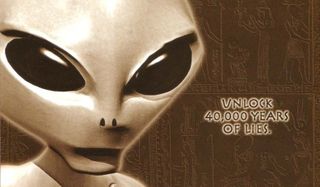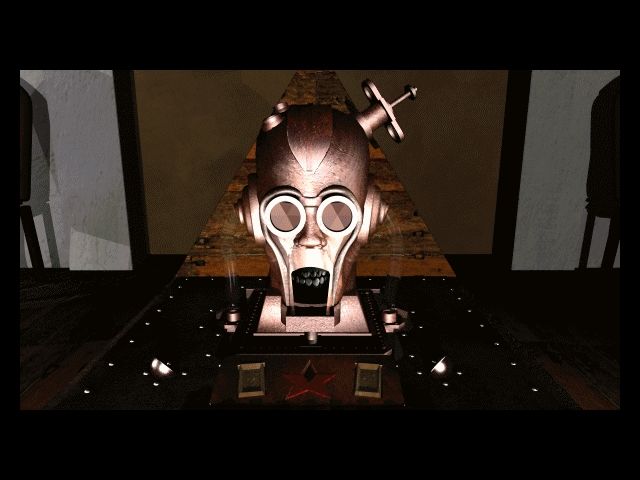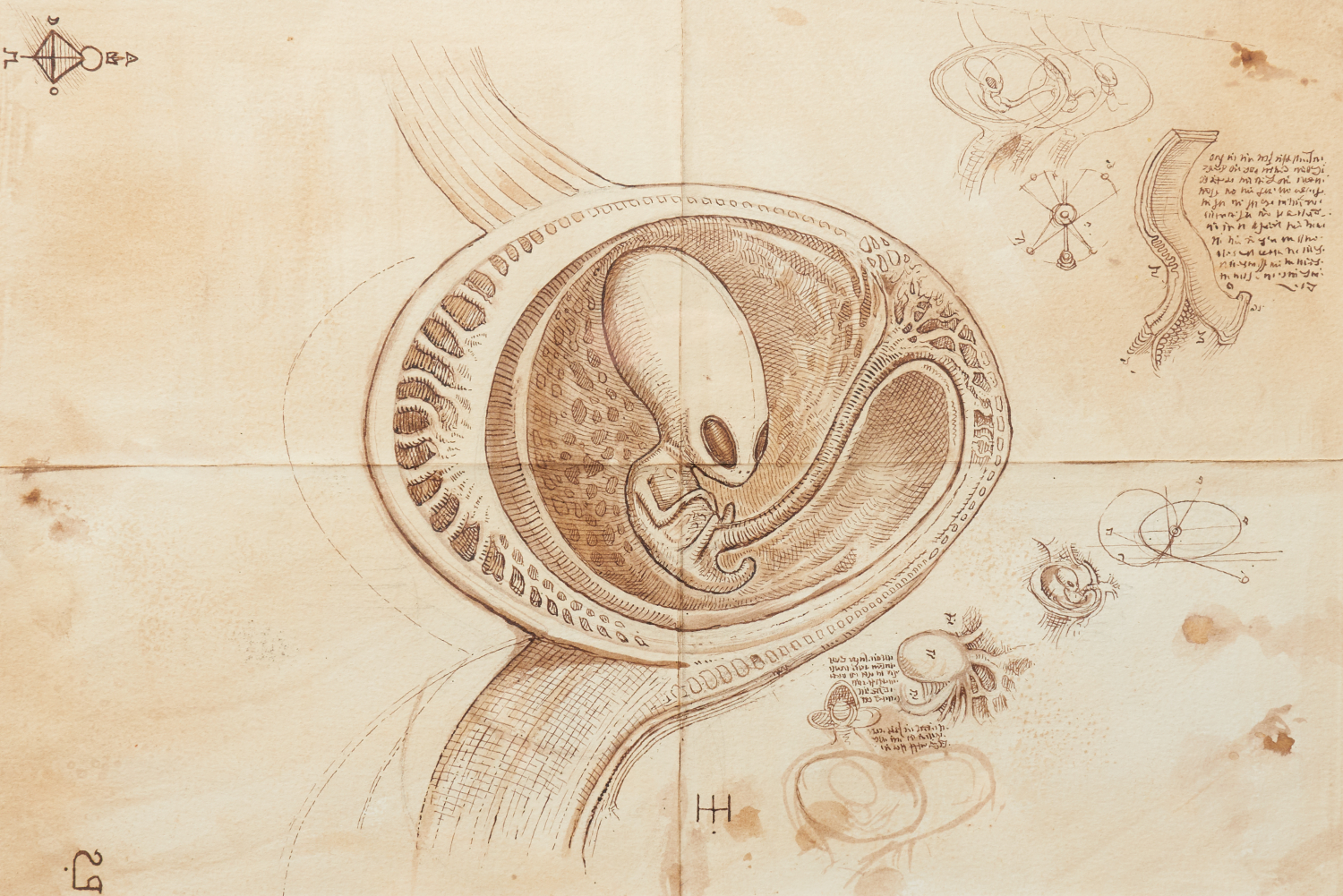Aliens, conspiracy theories, and a forged diary inspired one of the weirdest games of the '90s | PC Gamer - ernstsaussiona
Aliens, cabal theories, and a forged diary glorious one of the weirdest games of the '90s

We often hear about things being ahead of their time, but '90s religious cult pointedness-and-dawn take a chance Drowned Graven image: Conspiracy of the Ages is unexpectedly prescient in the neurotic macrocosm of 2021. "I would have loved to publish Drowned Deity at present," says Algy Williams, who produced the 1996 Inscape game that tapped into planetwide conspiracies and longstanding cultural myths. "You'd take a elite group media department as big as the art department and developers combined, wouldn't you?"
All of human history is supported lies and secrets, and humanity was actually created by past aliens
When Drowned God was first released, Williams recalls information technology rocketing into the top 10 videogame sales in the US. Now it's largely been forgotten, though it's belik one of the most fascinating and aesthetically experimental point-and-click games of all clock.
The originator of Submerged Supreme Being was author and political cartoonist Chevy Horse, who died under infamously tragic (and contested) circumstances in January 2007. In 1983, Horse forged a mysterious diary supposedly written by Richard Horne, a real 19th century poet with whom he shared a name; Horse had been born Richard Horne, but embraced "Horse" afterward someone misread his name at schooling and at length adoptive "Harry Horse" as a working pseudonym. The diary, which went into the poet's speculations and prophecies about the world, passed for real until Equus caballus was revealed equally its author. For most this would have spelled the natural end of an artistic trick. But over a decade later, with the turn out of indicate-and-click puzzlers like Myst, Cavalry decided it was time to resurrect his envision as a game.
Horse approached vitalizer and illustrator Alastair Graham, who recalls the writer contacting him "exterior of the blue" and sexual climax to his house where they stricken awake a "bad instant understanding." Graham flour became the courageous's co-creator and art theatre director, roped in Williams, and the rest, as they say, is history.
In terms of plot of ground, Sunken God took a somewhat "less is more" access to hand-holding just ends up becoming a real exercise in conceptual maximalism. Drawing divine guidance from the Kabbalah and tarot card cards, the premise is that all of human history—everything from the Illuminati to the Roswell aliens—is supported on lies and secrets, and that humanity was actually created by ancient aliens. You know, limited overindulge.

The player starts off in a mysterious room with the strange Bequest Orb—a gift of obscure provenance—before meeting two emissaries, Kether and Malchut, who play unlike philosophies and outcomes. They must then crosspiece time and infinite to solve puzzles (studied by St Catherine's College, Oxford enigmatist Chris Maslanka) and meet prodigious artifacts that reveal hidden truths about wholly of existence.
The sheer scope of neuroses at play in Drowned God is unimagined. The Obscuritory's Phil Salvador rather shrewdly describes it every bit something that "tricks you into believing conspiracy, placing paranoia to a higher place intellect, and celebrating the discovery of a marvelous unifying knowledge that exists because it has to."
Salvador distills the nitty-gritty of Drowned God down to a very simple idea: that to bribe into the game's deceit, and to play the game as it is meant to be played, you simply receive to embrace confederacy.
"We were nerve-racking to really push the boundaries arsenic much as we peradventure could," Ted Williams recalls of fib, which was written by Horse cavalry. "What I thought was interesting now is that a figure of things that were predicted have pretty much come typical. And I think what we were speaking about there, pulling together all of these conspiracy theories, it's very, very relevant. You've got QAnon making the rounds like a sho, and there weren't that many avenues for conspiracy theories, or not closely as many a avenues for conspiracy theories to bed covering and grow back then."
The mind of Harry Horse
When I enquire Algy Bernanrd Arthur Owen Williams and Alastair Graham about the making of Drowned God, information technology's sort out that both men have got a carnival of memories—good and distressing—associated with it. Ontogeny enclosed a whirlwind Continent tour thanks to few Time-Warner staffers who were having a "passionate love affair" busy. "They dragged us to a lot of interesting tourist sites in France and EU, just because they desired to go there," Williams recalls with a wry smile. "So we went to Chartres, we went to Stonehenge, we went to all of information technology, and it was a big jolly for them."
The eclectic team enclosed post-kindling instrumentalist Notice Burgess from The Chameleons, musical duo Miasm, two young developers named Anthony McGaw and Inigo Orduna, and animator/sculptor Greg Boulton, who worked on Peter Gabriel's painting Sledgehammer video. According to Ted Williams, Horse had also been in touch with writer William S. Burroughs, whose voice "appears somewhere in the game," simply no formal voice shape was authorized and Burroughs died in 1997, fashioning it difficult to support.
Shenanigans aside, a lot of those memories require on the job with Harry Horse. "Without a doubtfulness he was one of the most talented the great unwashe I've worked with in my 40-twelvemonth career," Williams says. "But… Harry had some very, selfsame intense highs and very big lows, and combining that with being a perfectionist and having a same, very clearly vision of what helium [wanted] to exercise, IT was sometimes very difficult."
Graham, who Horse straight approached to work on the game, is a little more restrained in his recollections. "The work that Harry was doing on Submerged God was a definition of him in very screaming, very careful—unpitying, one mightiness even say—[way], and that's what he was like," he says. "Helium was very difficult to work with when He was down… but I terminate't criticize him in terms of vision, in terms of hand-operated ability… he was unnerving."

Memories of Cavalry are confused over by the nature of his Death, said to be a suicide accord with his wife Mandy, WHO suffered from debilitating multiple induration. In a 2008 newspaper article, her father alleged it had been murder preferably than a Romeo-and-Juliet-style scenario. It's hard to separate the paper-thin boundaries 'tween Horse's creative work and personal life, especially when there's such speculation involved in both. It's besides difficult to examine the game in retrospect without Horse's end looming in the back up of one's mind.
Drowned God was very more than a '90s game: everybody was still making it up as they went on
Drowned God remains one of the most distinctive parts of Horse's legacy. It's a forgotten token of archaean question capture games and a bold statement for the power of data-based artistry in an industry that was even young and fresh. Both Williams and Graham are visibly proud of their initiation, despite CRO cuts that removed several worlds from the shipped game. "I think the weirdness of the story that we all envisaged came across really rather wonderfully," Williams says as Whole wheat flour chuckles in the background. "I know Harry would kick down ME black and blue [for saying this]—very early on, we had a very queen-sized mixing bowl… and we poured as many conspiracy theories as we could find. So we stirred with great heartiness, and poured out what ended up to be a remarkably and sometimes spookily coherent story. So I was really proud it at the end. I wasn't haughty of complete of the bugs… but we were forced to get the game out."
As one of the first games to role motion capture, there were by nature technological limitations like reduced material body rates that the squad had to tackle for the halt's experimental cutscenes. It was especially stimulating for Williams, who came from a motion-picture show and TV background and recalls the framerate issue as an "large compromise" to employment on average PC at the prison term.
"We did [the movement enamour] in North London… in a very very grotty old studio," he says. "The information that came out of the motion capture was so messy, it took an immoderate number of meter to fresh it up so that you could smooth possibly use it."
One of the most qualifier sequences was a medieval-themed cutscene—a shadowy affair filmed in black and white that adds a factual textural cinematic depth that unmatched wouldn't wait of a game of its sentence. And to make things level more thought-provoking, Theodore Samuel Williams recalls that QA and localisation of function weren't constitutional parts of the development outgrowth back then, and that ultimately Drowned God was a great deal a '90s mettlesome: everybody was still making it up As they went along.
A conspiracy for today

Today, the Drowned God rights are shared between Williams, Graham, and Plague Horse's estate; some surviving material for the planned sequel, CULT, lies in the hands of the estate, which didn't react to my emails. "I still get over the odd person who gets through to contact Pine Tree State who's still quivering in their bunkers, wanting to make love if on that point's whatever plans for sequels, which is always rather gratifying," Williams says with a laugh.
After all these years, likewise providing Williams with a "marvelous keep down of after-dinner stories," the sub-rosa tales of Sunken God are atomic number 3 inscrutable as the late Harass Horse, and probably are best left that way. "I think it probably cured Pine Tree State of continuing to develop games, and allowed me to do something slightly little exciting and foreign," Williams says, reflective connected the sextuplet months he washed-out crunching while also lovingness for his young children.
Graham describes it as "a real education" even though he's ne'er plane played the ended game. "This is sacrilegious," he says. "I was ne'er interested in games, and I'm still a trifle in this corner. Simply my impression, my feeling was one of genuine excitement because I hadn't worked in this kinda medium before."
When I ask Williams why atomic number 2 thinks Horse would have hated his "mixing bowl" description of the conspiracy narrative, Williams admits that he didn't personally leap "feet-forward" into believing the truth behind the tales that drove the game's plot; on the other hand, he finds it amusing that today we know that the US government has usurped aliens seriously all along. "So whilst Pig Human race isn't walking around the streets of Los Angeles—though he may be—in that location are huge advances in genetic science now, which means the dividing line is blurred," says Williams. "The atm is sol symptom now that I remember Drowned Immortal's time has come, but probably not in a signal-and-click pun."
For Graham, Drowned God seems to be more of an exploration of the power and potential of belief. "I believe near of information technology, because I want to conceive that sort of thing. I'm not serious, by the way," he jokes. "Simply it's infinitely mineable in that there's much that's available, which is thus striking and mathematical, it's a delight juggling with it, actually."
Source: https://www.pcgamer.com/aliens-conspiracy-theories-and-a-forged-diary-inspired-one-of-the-weirdest-games-of-the-90s/
Posted by: ernstsaussiona.blogspot.com


0 Response to "Aliens, conspiracy theories, and a forged diary inspired one of the weirdest games of the '90s | PC Gamer - ernstsaussiona"
Post a Comment